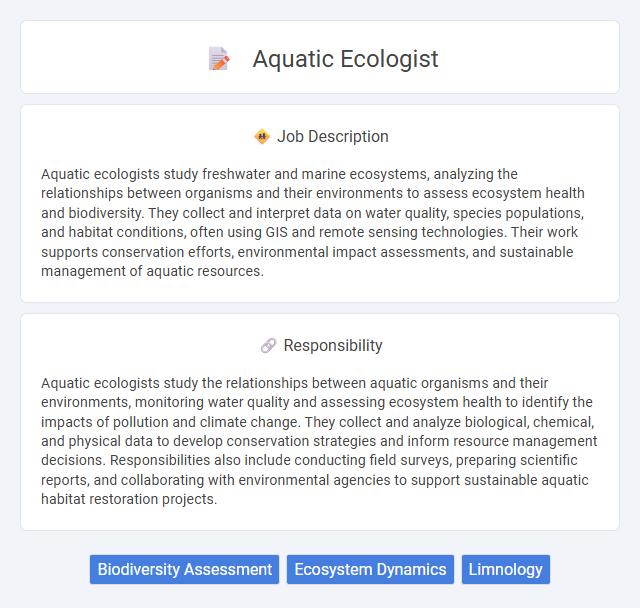
Aquatic ecologists study freshwater and marine ecosystems, analyzing the relationships between organisms and their environments to assess ecosystem health and biodiversity. They collect and interpret data on water quality, species populations, and habitat conditions, often using GIS and remote sensing technologies. Their work supports conservation efforts, environmental impact assessments, and sustainable management of aquatic resources.
Individuals with a strong interest in aquatic environments and a background in biology or environmental science are likely to find a career as an aquatic ecologist suitable. Those who enjoy fieldwork, data analysis, and working in natural settings may be well-suited for this role, whereas people who prefer office-based or less physically demanding jobs might find it challenging. The probability of job satisfaction increases for candidates who are adaptable to outdoor conditions and passionate about conserving aquatic ecosystems.
Qualification
Aquatic ecologists typically hold a bachelor's degree in ecology, biology, environmental science, or a related field, with many pursuing advanced degrees such as a master's or Ph.D. Specialized knowledge in freshwater and marine ecosystems, water quality analysis, and species assessment is essential. Proficiency in field sampling techniques, geographic information systems (GIS), and data analysis tools enhances job performance and employability.
Responsibility
Aquatic ecologists study the relationships between aquatic organisms and their environments, monitoring water quality and assessing ecosystem health to identify the impacts of pollution and climate change. They collect and analyze biological, chemical, and physical data to develop conservation strategies and inform resource management decisions. Responsibilities also include conducting field surveys, preparing scientific reports, and collaborating with environmental agencies to support sustainable aquatic habitat restoration projects.
Benefit
Working as an aquatic ecologist probably offers substantial benefits, including opportunities to contribute to environmental conservation and biodiversity preservation. There is a likelihood of engaging in impactful research that can influence water quality management and habitat restoration. The role may also provide chances for fieldwork in diverse aquatic environments, promoting both professional growth and personal fulfillment.
Challenge
An aquatic ecologist likely faces challenges related to unpredictable environmental changes and human impacts on water ecosystems. Managing the complexity of biological interactions in aquatic habitats may demand advanced analytical skills and adaptive research methods. Balancing species conservation with resource use could present ongoing difficulties in achieving sustainable ecosystem management.
Career Advancement
An aquatic ecologist advances their career by gaining expertise in freshwater and marine ecosystems, often pursuing specialized certifications and advanced degrees such as a Master's or Ph.D. in ecology or environmental science. Experience in field research, data analysis, and environmental impact assessment enhances opportunities for leadership roles in government agencies, environmental consulting firms, or academia. Networking through professional organizations like the American Fisheries Society and publishing research in scientific journals are critical for career growth and recognition.
Key Terms
Biodiversity Assessment
Aquatic ecologists specializing in biodiversity assessment conduct comprehensive surveys of freshwater and marine ecosystems to evaluate species richness, abundance, and distribution. They utilize advanced sampling techniques and data analysis tools to monitor ecosystem health, identify invasive species, and detect changes in habitat quality. Their findings support conservation strategies, inform environmental policies, and promote sustainable management of aquatic resources.
Ecosystem Dynamics
Aquatic ecologists specializing in ecosystem dynamics analyze the complex interactions among aquatic organisms and their environments to understand energy flow and nutrient cycling. They employ field studies and modeling techniques to assess impacts of environmental changes, such as pollution or climate variability, on freshwater and marine ecosystems. Their work supports the development of conservation strategies and sustainable management of aquatic habitats to maintain biodiversity and ecosystem health.
Limnology
Aquatic ecologists specializing in limnology study the physical, chemical, and biological properties of freshwater ecosystems such as lakes, rivers, and wetlands. They analyze water quality, sediment composition, and aquatic organisms to assess environmental health and biodiversity. Applying limnological principles, these ecologists contribute to conservation efforts, pollution control, and sustainable water resource management.
 kuljobs.com
kuljobs.com